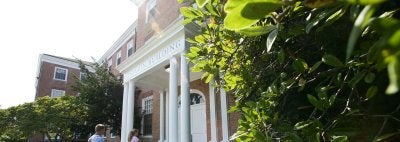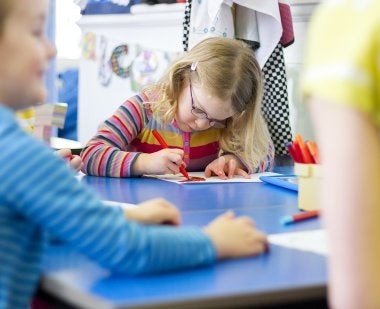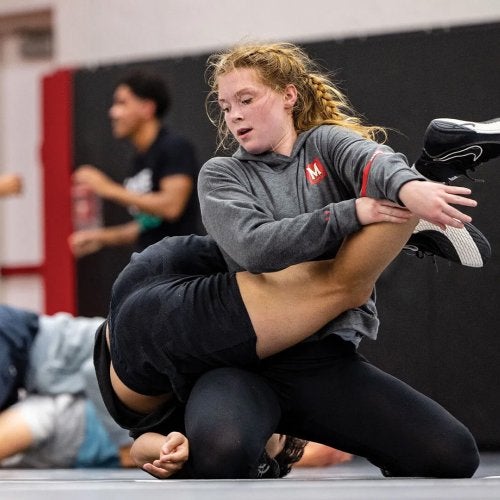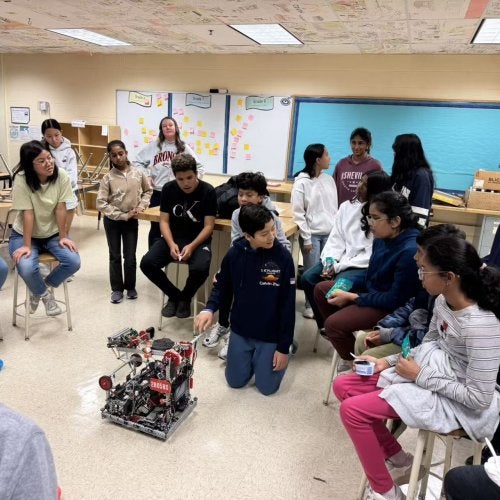

Benjamin Broadcast Episode 1 - Special Education

To celebrate the College of Education's Centennial, COE is proud to announce the inaugural episode of its new podcast series, the Benjamin Broadcast!
The first episode of the Benjamin Broadcast examines the College's influence on the field of Special Education, with guests Dr. Linda Jacobs (Ph.D. '71), Dr. Margaret McLaughlin, and COE doctoral student Alexandra Shelton.
Be sure to tune in regularly for new episodes of COE's Benjamin Broadcast, available here, and on SoundCloud. A transcription of the Benjamin Broadcast Special Education episode is available below. Enjoy!
BENJAMIN BROADCAST SPECIAL EDUCATION TRANSCRIPT
HOST: Thanks for tuning in to the Benjamin Broadcast, presented by the University of Maryland College of Education. I’m your host Chris Samoray, and as we celebrate 100 years of leadership in education this year, we reflect on the College’s role in furthering special education and training leaders in the field. In today’s episode, we speak with College of Education alumni, professors, and students to understand the history and current topics in special education in the U.S.
LINDA JACOBS: Well, we have a manicure salon. We have a resale consignment shop. We have a technology shop. We have an auto detailing shop. The name of the shop is OCD detailing, which the grownups think of as obsessive-compulsive disorder, but actually it’s the Oceanic Car Detailing.
HOST: Who you just heard from is the head of the Harbour School.
LINDA JACOBS: I’m Linda Jacobs. I’m the executive director of the Harbour School, and we have a campus in Annapolis and Owings Mills.
HOST: She’s describing the Friday Village at the Harbour School, where special education students develop professional skills by operating real businesses, and this means paying rent and utilities all while turning a profit—not to mention being regulated by the students’ self-formed and governed Town Hall. The village’s backdrop includes wall murals depicting the village’s shops, along with Dr. Jacobs’ cockered spaniels running the halls.
LINDA JACOBS: The school does not in the least bit look institutional.
HOST: The Harbour School is a nonpublic special education school, meaning it’s accredited by the state department of education to accept tuition from local school districts if they are unable to provide an appropriate education for a special education student. Besides the village, the school stands out in other ways, too, Dr. Jacobs says
LINDA JACOBS: The thing that is particularly unique about harbor is we start with the child. So, we teach the way the child learns. We actually look at the kid. We look at how the child is designed to learn, and then we match our instruction to the child. It’s not the other way around. So, the child doesn’t have to conform to the teacher. We conform to the child.
HOST: But these developments are new to special education, which until recently, was not even a guaranteed right for students. Let’s hear from COE Professor Margaret McLaughlin of COE’s Department of Counseling, Higher Education, and Special Education. She has served as an expert witness in education lawsuits, and describes how the special education landscape was different from today.
MARGARET MCLAUGHLIN: Well, prior to the passage of the federal law, and preceded by state law, including Maryland, children with disabilities did not have a right to attend a public school if they didn’t meet the requirements of the public school. So, those laws that came in the 60s in the states and 70s in the U.S., the first thing they put forth was zero reject, which I think it is probably the most significant right that we sometimes forget about—that no child is considered to be uneducable or ineligible for a publicly funded education regardless of level of functioning or type of disability.
HOST: One big name in the early days of special education was COE Professor Emerita Dr. Jean Hebeler. She played a definitive role in landmark cases such as the Pennsylvania Association for Retarded Children v. the Commonwealth of Pennsylvania. She was also instrumental in steering Linda Jacobs toward the special education field, even becoming Jacobs’ COE adviser during graduate school. Dr. Jacobs speaks on Hebeler’s influence on the field of special education.
LINDA JACOBS: Very huge. In fact, back in the early 70s when the big push came through with court cases to require school systems to provide appropriate educational programs for kids with disabilities, Dr. Hebeler was scheduled to testify at the PARC case and she was a key witness. The Pennsylvania State Department of Education caved right before she testified. And we used to always say, they were so scared of her testimony that they just gave up.
In addition to the University of Maryland’s program becoming the leadership preparatory program in the state of Maryland for special ed teachers, Jean Hebeler was also National President of the Council for Exceptional Children and had many other national CEC offices. So, she not only had an influence but she spread the influence of our school on special ed.
HOST: But legal protections aside, some students still need extra help, Dr. McLaughlin says.
MARGARET MCLAUGHLIN: Many students need extra help.
HOST: An Individualized Education Program, or IEP is one way students get the help they need. It’s a contract or set of guidelines describing a special education student’s needs and what the school is doing to support them.
MARGARET MCLAUGLIN: That, sometimes referred to as the sacred document. But it’s the document that represents the educational goals and plan for every individual student that becomes the manifestation of what’s considered appropriate for that student. And only students who are found to be eligible for special education get the IEP. To be determined eligible, it’s a two-prong process. First you have to have documented a disability. The second step is then if you have that disability, it has to have an educational negative which then entitles you to these services.
HOST: Still, an IEP doesn’t guarantee success. IEP requirements can be a subject of conflict, and may not be enforced properly. Dr. McLaughlin says that another key issue in special education, and education in general, is literacy. Supporting this is recent national testing showing low average literacy rates nationwide. At COE, literacy and reading comprehension are of concern to one doctoral student who studies the topic in special education.
ALEXANDRA SHELTON: My name is Alexandra Shelton. I’m a fourth-year doc candidate in the special education program in the College of Ed here at the University of Maryland.
Recently, the National Assessment of Education Progress, or NAEP, released this report. On the fourth-grade literacy or reading assessment, they found that 35% of fourth graders scored at or above a proficient level. So, we have 35% of fourth graders who are reading as we expect them to read or above our expectations. So, that means that 65% are not reading as they should, and this is fourth graders in general. When you look at the statistics for fourth graders with disabilities, only 12% are reading at or above a proficient level.
HOST: And those rates are similar for eighth graders, too.
ALEXANDRA SHELTON: There’s a lot that needs to be done so that we can see more improvement in these rates.
HOST: And for Alexandra, the future is literacy, with special education leading the way.
ALEXANDRA SHELTON: I really see the field of special education as really taking a leadership position in improving literacy for students across the country. We’ve done the research as a field. We know what works for students. We know what helps them read. We know how to improve their reading comprehension, but unfortunately, students aren’t always receiving the instruction they need. So, I can see that changing as we talk more about literacy and as we bridge the gap between research and practice. And it’s important that we don’t forget that everyone needs literacy. It shouldn’t only be accessible for students without disabilities.
HOST: Literacy can help students gain employment and continue on in education. It’s an important resource. And resources are critical for students to succeed, Dr. Jacobs says.
LINDA JACOBS: Give these kids what they need, so they can contribute to society, so they can feel good about themselves, and they’ll participate with the rest of us.
HOST: As for parents’ role, Dr. Jacobs says …
LINDA JACOBS: Fight. And I just hope parents don’t get tired, and that they find enough support, and they look at their kid and realize I gotta get up, get dressed, and fight another day.
HOST: And a reminder from Linda, to visit the Harbour School Village Shops on Fridays. She points out that the services offered at OCD—that’s Oceanic Car Detailing—are quite a steal.
LINDA JACOBS: For 10 bucks, you can get your car washed and vacuumed. It’s really a bargain. If you’re in the area, come by.
HOST: Thanks for joining us. Stop by again for the next episode of the Benjamin Broadcast. And visit education.umd.edu to stay in the loop with the University of Maryland College of Education, and informed on developments in the education field.


